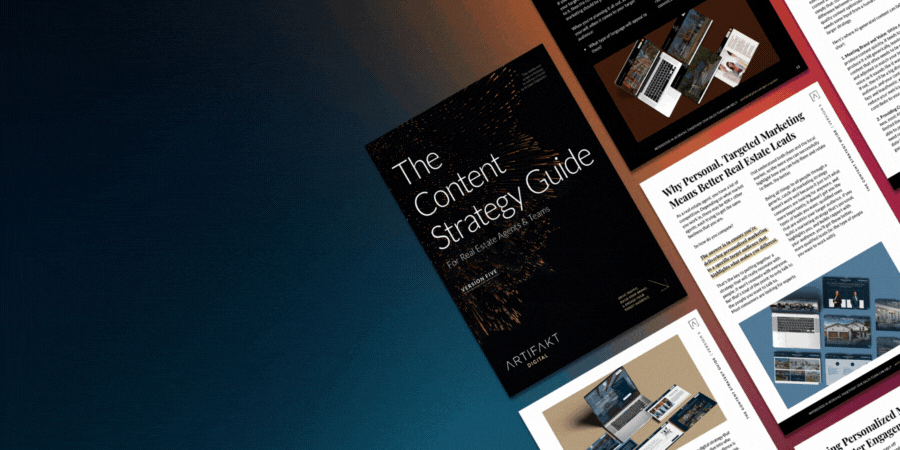The Benefits of Building a Long-Form Real Estate Content Strategy

When it comes to building a solid content strategy, quality is key. If you aren’t writing quality content that provides something of value to your target audience, then there isn’t much point to writing content at all. Writing content just for the sake of writing content or just because you think you have to is not a viable or successful content strategy – your content must be considered high-quality.
What is high-quality content? It’s content that:
- Is well-written, well-planned, and brings real value to the person reading it.
- Is helpful to the reader by answering whatever question brought them to your piece of content in the first place.
- Is well-formatted and stylized so that it’s pleasant to look at and read.
- Is backed up with links to additional, related content that can provide more value to the person who’s reading it.
In short, it’s content written with purpose and a plan.
So, when it comes to building a high-quality content strategy, how important is it to include long-form content to see success? The answer is, in most cases, very important.
That’s because, while short-form content can be useful in places where people expect to read short-form content, like in social media posts or in an email newsletter, long-form content is more useful when someone is looking for an answer to more complicated questions where short-form content won’t help, like in a blog post or article.
For example, if you’re writing a post about: when is the best time of year to sell your condo, just saying: The Spring, and including a few bullet points and some cute emojis, isn’t the same or anywhere near as effective as writing a long-form piece of content that clearly outlines the best times to sell a home and backs it up with detailed information, outlines why, and maybe even backs it up with some personal examples or success stories.
Long-form content helps you build authority, boost engagement metrics, establish expertise, and ultimately, work towards making your audience trust you and your opinion.
So, if you’re writing long-form content, how long does your content actually need to be? The answer is: as long as it needs to for you to produce a well-written, well-supported, well-formatted, detailed piece of content that resonates with your target audience and answers the question that brought them to your content in the first place (but generally speaking, at least 1000 words, as it’s difficult to do all of that in less words than that, but it can certainly be a lot longer provided the additional information is useful).
★ Want to learn more about building a content strategy? Have a look at these posts:
- When (and When Not) to Use AI in Your Real Estate Content Strategy
- Creating a Content Strategy Based On Emotional Search Intent (To Get Better Leads)
- Creating an Evergreen Real Estate Content Strategy
A long-form content strategy is also an important part of a successful SEO strategy – the two go hand-in-hand. That’s because it’s part of the many signals that Google uses to measure the EEAT (Experience, Expertise, Authority, and Trust) of content, because it shows authority and builds engagement (which is another highly-important part of a successful SEO strategy).
★ If you want to learn more about EEAT, have a look at this post called: Why Building Trust is a Key Part of a Successful SEO Strategy.
Long-form content, that performs better in search, is also more likely to perform better and show up in AI search and Google’s AI Overview results, so it’s also a good approach to future proofing your overall SEO and search strategy a bit.
★ Want to learn more about building a successful SEO strategy? Have a look at these posts:
- How to Do Keyword Research for Your Real Estate SEO Strategy
- Best Practices When Rebuilding an SEO Successful Real Estate Website
- The Three Components of a Successful Real Estate SEO Strategy
- Building a Successful Real Estate Off-Page SEO Strategy
- Understanding SEO Titles and Meta-Descriptions on Your Real Estate Website
But long-form content isn’t just better for search results – it’s also better for the person reading it (and part of why it contributes to high-quality content strategy), because it helps build authority, trust, and expertise, especially when it comes to answering someone’s questions in detail.
That’s because most people don’t just want a yes, no, or short-sentence response to something – they also want you to be able to back it up, especially if they’re in the early research phase of trying to get an answer. Ultimately, a successful content strategy is all about making your audience trust you, and a great way to do that is by writing a long form piece of content, that answers their question thoroughly and shows you as an expert in your field and market.
At the end of the day, building a content strategy that gets results takes a lot of effort and a lot of time, but by writing content (that’s often naturally longer) that works towards providing value to your audience, you’ll be building a real estate content strategy that sets you up for long-term success in the future.
Want to improve your content strategy? Download our Content Strategy Guide for Real Estate Agents. It has practical methods on how to plan, implement, market, and audit a successful real estate content strategy that will deliver results as part of your overall inbound marketing strategy.





















